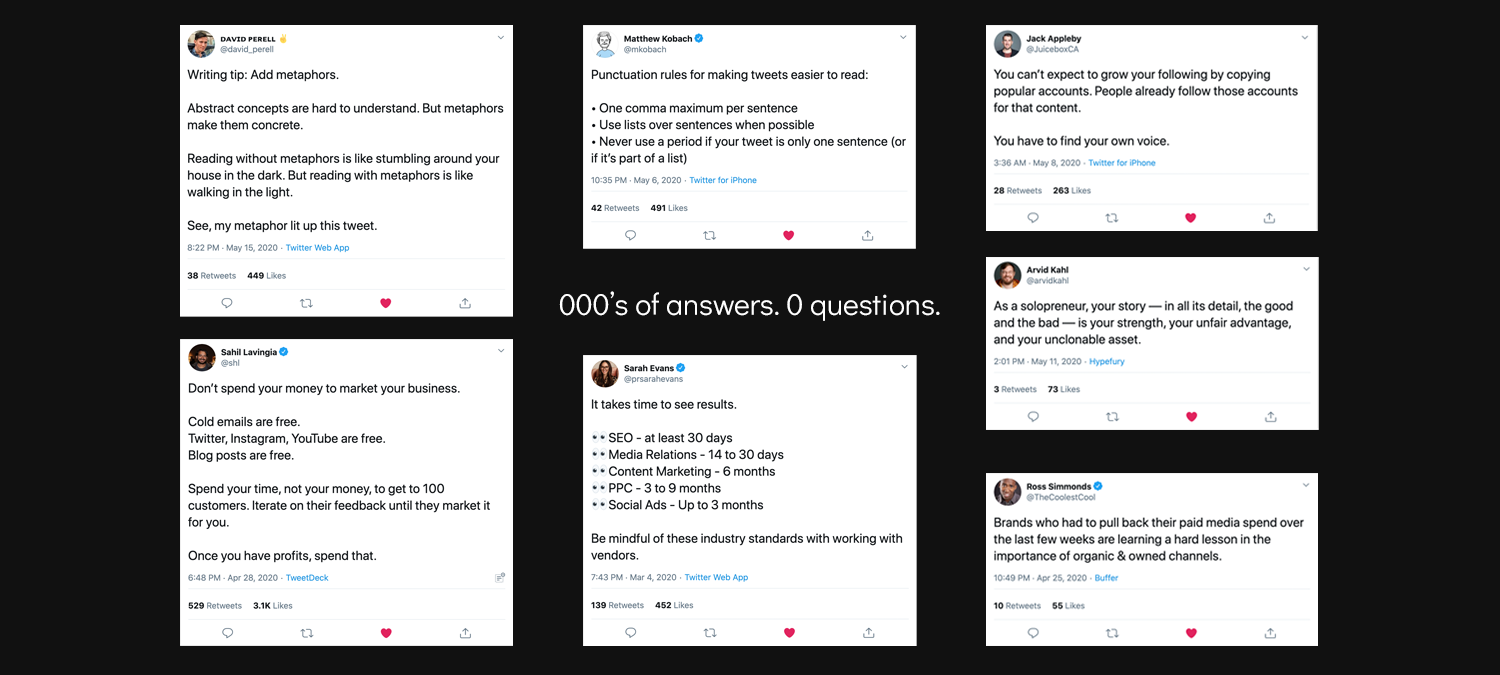Time to stop following marketing experts
Learning when to ignore the experts, so they don't disrupt your mindset and dilute your marketing.

Learning when to ignore the experts, so they don't disrupt your mindset and dilute your marketing.
Every 6 months I like to have to remind myself of something very simple.
Reading too much into what others suggest you should do, will not make your marketing more effective or your work life more enjoyable.
It’s not easy to build a business, market your product, or win over an audience. So we turn to others with experience, to help us simplify the process. Here’s when that can do more harm than good, and some advice on how to take advice.
Great answers create more questions
The problem is, experts only have great answers, when you have a specific question you want answered.
Without a question, expert opinion is nothing more than a distraction. A distraction that – even if you agree with – still wont help you.
You have to be incredibly strong minded to ignore tweets and opinions from people you admire – especially when you agree with what they’re saying.
If consistency is one of the keys to success, then social networks can make you forget where you put them. Every time you need to go out.
Twitter is your quickest way to self doubt
I 💙 Twitter.
Facebook pulls your memories, Twitter pushes you forwards.
If you’re aspiring to build a business; market your product; find your audience; the value it brings is incredible. I recommend Twitter to everyone.
I offer just one disclaimer:
Your feed isn’t designed to answer a question you’ve asked, which means it’ll often inspire more questions.
Traditionally if you have a problem, you’ll ask for help, read a book or search Stack Overflow. That’s a great way to tackle a problem because you’re in the middle of solving it. You need an answer, and there’s people out there that can help you right now.
Unwelcome questions
But Twitter, can interrupt you with a new question. Every. Single. Scroll.
Character limits make opinions look like facts, and uncover questions you didn’t have before, feel more pressing than ever before.
Unplanned distractions
You had a plan for today, but after scrolling your favourite feed, there’s a few more bookmarks and a few more things that you now absolutely have to do instead.
I see it happen a lot, because marketing is a subjective art; with 000’s of methodologies; and no proven answers. You can even end up liking 2 tweets, with completely contradictory advice.
You can’t expect to grow your following by copying popular accounts. People already follow those accounts for that content.
— Matthew Kobach (@mkobach) May 8, 2020
You have to find your own voice.
Then 20 minutes later...
You can’t expect to grow your following by copying popular accounts. People already follow those accounts for that content.
— Jack Appleby ☕️ (@jappleby) May 8, 2020
You have to find your own voice.
Yeah, Marketing can be ultra confusing.
Though this is quite universally happening for all professions and on all sorts of amazing platforms. Not just Twitter.
- “Shit! I should have gone with React over Angular, this thread is spot on.”
- “I went with Ghost, but Bear is so much faster, I should redo.”
- “I knew I shouldn’t have gone with rounded corners, they look dated now.”
It’s the reason we all need a filter, and in most cases that’s your boss pressing you not to waste time…
When you’re accountable for yourself though, Twitter should be understood in the ways above.
And if you’re like me, it’s good to remind yourself of that every now and then.
Who’s in control around here?
Reading too much into what other marketers suggest doing, will not make your marketing more effective or your work life more enjoyable.
- The more you read, the less you do.
- The more you read, the less you know what to do.
- The less you know what to do, the less you do.
You’d think learning more would help us perform better.
That hasn’t been my experience over the past few months. The truth is, if you’re feeling anything like the above then you don’t need experts.
They’re not going to help.
Comparison is the thief of joy
- Theodore Roosevelt
A proposed method for improving things:
- Remove myself from the networks that are making you feel worse.
- Talk to people who can restore confidence yourself.
- See the process itself as a valuable lesson.
A proposed mantra for moving forward:
- You have come this far, stop polarising your creativity, and trust yourself.
If you’re struggling with something similar, or you have something to add – I would absolutely love to hear from you.
Marketing makes you think.
I write because I find it cathartic, and to share with you any value I distill from my experience.
🙅♂️ I ignore statistics which I find pointlessly overused.
🙅♂️I ignore industry averages which I find pointlessly pointless.
I prefer using marketing examples, writing with metaphors, and telling you how I think. Not what a report said 94% of marketers think the future holds.
You can join me on this quest for answers, and I’ll try not to introduce too many questions along the way.